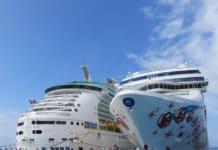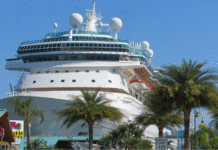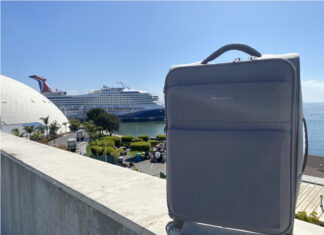With news that the first person in the United States has tragically died from the coronavirus and fear of more cases spreading, worry about the illness has seen a sharp uptick.
Worldwide there’s been a strong reaction to the virus. Entire cities in some countries have been locked down to limit the spread, large gatherings have been cancelled, and many businesses shuttered. Even the Louvre in Paris closed over fears of the illness.

Cruise lines have certainly seen their share of disruption. In addition to advanced health screens and shipboard sanitation they’ve implemented, lines have gone so far as cancelling sailings in China. They are also denying boarding to anyone who has recently traveled to China or Hong Kong, and in some cases other regions hard-hit by the coronavirus.
However, outside of Asia, cruises continue to largely sail as scheduled. As Royal Caribbean says on their “Coronavirus (COVID-19) Travel Alerts” page:
“We are unaware of any significant travel restrictions, delays or quarantines anywhere else in the world. Accordingly, we look forward to welcoming our guests who are booked on itineraries outside Asia onto their cruises as scheduled.”
Could that change? Is it possible that the biggest market for cruises — the United States — could see cancelled trips in the future?
Drastic Moves By Cruise Lines to Limit the Virus Impact
While cruises have so much to like, there is no denying that a ship can see a virus spread quickly.
Before this coronavirus, norovirus — a gastrointestinal illness — hitting cruise ships made the news regularly. As Kelly Hills, bioethicist of the consulting firm Rogue Bioethics says, “Cruise ships are a confined space, and we know from past outbreaks that viruses really like to run rampant in confined spaces.”
In other words, if there is someone with an illness, then it could spread on a ship.
To combat this, cruise lines have enacted rules about who can board during the outbreak.
For instance, Royal Caribbean will not allow anyone who has been to “China, Hong Kong, Macau, Iran, South Korea, and the Italian regions of Emilia-Romagna, Lombardy and Veneto” during the last 15 days.
Anyone who has been in contact (described as within six feet) of someone that has gone to these places will also be denied boarding. Anyone with flu-like symptoms will not be able to board.
Meanwhile, those who have been to Japan, Singapore, Thailand and anywhere else in Italy in the past 15 days will have a health screening before being allowed on the ship.
For U.S. cruises, many passengers come from domestic locations to sail. Right now there are about 70 confirmed cases in the U.S., but literally thousands of people are under observation.
What happens if the coronavirus has an outbreak here in the United States?
We’ve seen just how quickly the virus can spread. In the hard-hit regions of Italy — which some cruise lines are already denying boarding to recent visitors — the total number of cases jumped from 79 on February 22 to 1,128 just a week later.
Ports of Call Have a Say Too
It’s not just the cruise lines and passengers that are impacted if there are sick guests or crew on the ship. Ports of call can refuse to grant a ship entry if they are worried about virus spread.
We recently saw this with the MSC Meraviglia. A crew member reportedly sick with the flu led authorities in Jamaica to deny the ship from letting passengers off in port.
If a ship sails, it doesn’t always mean that other countries will allow it to dock. If there were to be a bigger outbreak in the United States, it could mean foreign ports won’t allow ships to visit.
Our Opinion on What Could Happen
In our years of following the cruise industry, there has never been a situation quite like the coronavirus outbreak. The closest comparison are hurricanes, where the threat is relatively well-known, concentrated in a specific area, and typically only a few days. In this case, no one knows what the virus will do from here.
Meanwhile, the North American market is a large segment for major cruise lines. Carnival Corporation (parent of Carnival, Princess, Holland America, and more) gets more than half their passengers from the region according to SEC filings. Royal Caribbean Cruises LTD. gets about half of their passengers from North America.
That means any disruption in service in the area could have a significant financial impact on the major cruise lines — above and beyond what’s already been felt.
This, combined with the relatively limited number of cases of coronavirus confirmed in the U.S., is why we think the cruise lines will continue to sail as normal for the time being. That could change quickly, however.
If confirmed cases in the U.S. increase sharply, it wouldn’t surprise us to see similar restrictions about who can board a ship apply to certain states if there is a concentrated outbreak there. So just as passengers who have been to certain parts of Italy are denied boarding in some cases, it could apply to passengers who have been to certain parts of the United States.
Finally, if the outbreak becomes widespread across the country, with thousands sick, it’s reasonable to think that cruises from the United States could look at cancellations for health reasons. After all, no one — cruise lines, passengers, or ports of call — want to see coronavirus on a cruise ship.
To be clear, things aren’t there yet and hopefully never will be. We’ve seen, however, this situation bears watching.
What You Should Do If You Are Worried About Coronavirus
If you’re worried about coronavirus, there is some good news.
Like with a norovirus, just because one ship was impacted doesn’t mean that all others are going to have the same fate.
On top of this, it may be some peace of mind to consider the measures that cruise lines have put into place to limit the spread of coronavirus.
With denying boarding to passengers that have recently been to China, Hong Kong, South Korea, Italy, and Iran, a cruise line covers about 97% of currently known coronavirus cases. Simply denying boarding to those that have been to China covers around 91% of confirmed cases worldwide.
Finally, it’s a good idea to use common sense to stay healthy during your cruise. Hand sanitizer is available everywhere on the ship. Use it throughout the day. As well, avoid touching your face or mouth, and wash your hands before every meal.
Overall, your odds of getting sick right now sailing from the United States are low. As Dr. John Lynch, who has specialties in infectious disease and travel medicine at University of Washington School of Medicine, told CNN: “I think there’s extremely low risk of getting novel coronavirus on a cruise ship. I wouldn’t hesitate to get on a cruise boat, if that’s something you like to do.”
Update: Since this article was published, the U.S. State Department has said the following:
“U.S. citizens, particularly travelers with underlying health conditions, should not travel by cruise ship. CDC notes increased risk of infection of COVID-19 in a cruise ship environment. In order to curb the spread of COVID-19, many countries have implemented strict screening procedures that have denied port entry rights to ships and prevented passengers from disembarking.”
If you are worried about the virus, cruise lines have implemented more flexible cancellation policies to make it easier to move your trip to a different date.













Why Disney Cruise cannot be flexible on their cancellation policy for this year’s cruise? All we asked is Disney can turn this year’s cancellation penalty into a voucher or credit for our 2021 booking. You are simply putting families under a stake and turning loyal customers away!!
I am very disappointed about Disney Cruise right now. They still firmly stand by their standard cancelation policy. Many other cruise companines have make temporary changes to allow customers postpone their sailings or move to other locations without any penalties.
Disney Cruise is mostly for kids. They should consider the worries of parents and make some alliances in their cancellation policy, under the current worsening corona virus situation.
I think it’s time to cancel the cruises to the Caribbean. There are cases in FLorida, Dominican Republic, 4 waiting results in Bahamas, etc. So does this mean if you get to dock in any of the forever mentioned, will u be allowed to disembark.? Would u want to? If we fill out “the form”, we as US citizens will have to say yes, we are coming from a country with the virus. Will we be allowed to disembark. Would u want to. What happens when someone gets sick with the flu vs. Caronavirus? We get to float around with 3 to 4000 people and hope someone lets us dock? Then we get quarantined for two weeks. Then worry if we will be able to re-enter the US. Then more quarantine time. Possible one month later, if we are not sick or dead we get to go home. Forget it. Maybe next year.
Next week we are scheduled to sail on (our first) Disney Cruise to the Caribbean. We received an e-mail from Disney on Saturday that says in part: “As is always our practice, we screen all guests before they board and anyone who feels unwell with gastrointestinal or flu-like symptoms (fever over 100.4º F, chills, cough or difficulty breathing) will not be permitted to sail.” My daughter has those symptoms, and her pediatrician says some of this will likely continue for a couple of weeks. I spent an hour and a half on the phone with Disney, only to be told that she might be denied boarding once we get there – after a two-day drive! They won’t do anything now, yet they want us to call and waste our time, only to be told NOTHING. My guess is that others are experiencing the same issue. I know two of my friends who are also scheduled to go on cruises for spring break and dealing with identical concerns, one of whom also has a sick child right now. With spring break being next week and the week after (depending on which county you are in), this might be a good angle to pursue…How are cruise ships handling the additional screening and cancellations/rebookings in light of the heightened standards for boarding due to coronavirus? Thanks for your consideration.